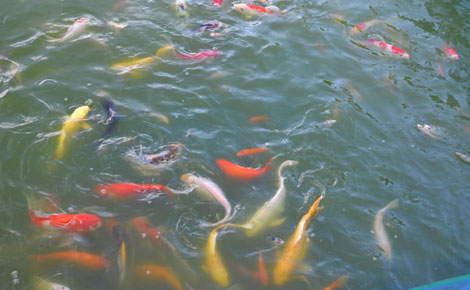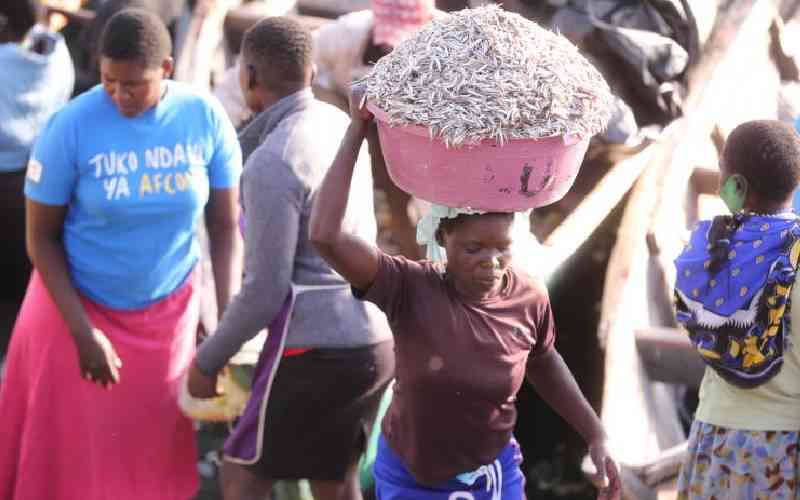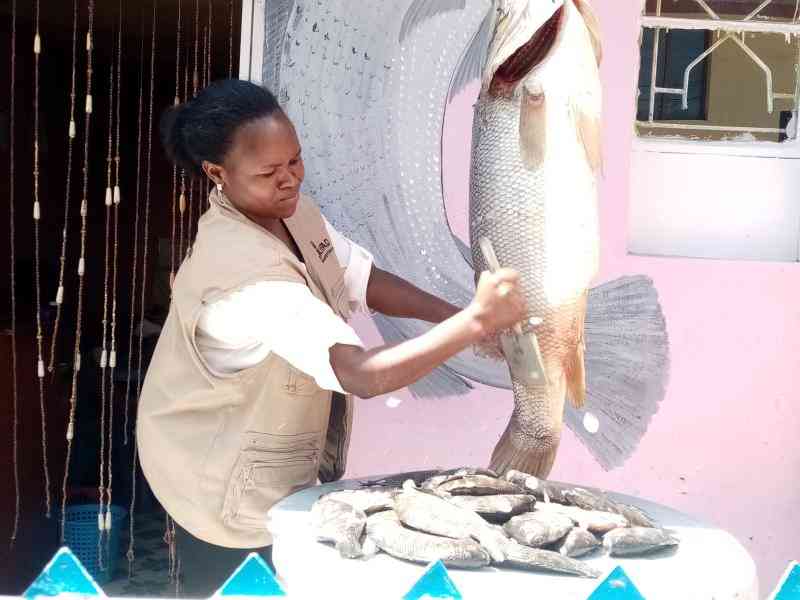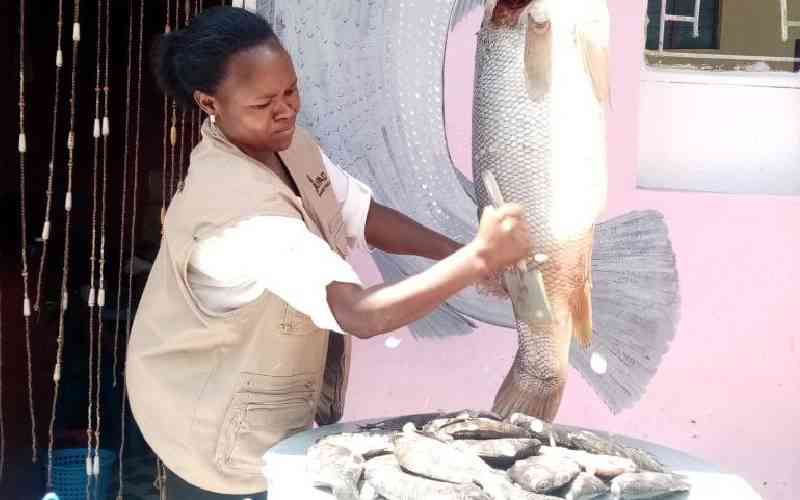 |
|
Some of the ornamental fish in David Kiama's farm near Sagana Town. (Photo:Munene Kamau) |
Moses Kiama did not think much about farming when he was growing up but focused his attention in politics where he served as a civic leader for two terms at the now defunct Sagana Town Council.
After failing to retain his seat in the 2002 General Election, Kiama decided to try his hand in fish farming which had just been introduced in his region.
Today, Kiama is famous in the fish farming sector and has become a certified ornamental fingering breeder. The 50 year old Kiama hails from outskirts of Sagana Town in Kirinyaga County, about 100 kilometres north-east of Nairobi where he has established a fish empire comparable to no other.
He is an ornamental fish farmer of excellence going by the big names who have visited his shamba on learning tours or paying courtesy calls.
Recently, Cabinet Secretary for Agriculture Felix Koskei visited his green energy highland fish farm and showered the farmer with words of praise for being such a successful entrepreneur.
The farmer says he started rearing ornamental fish after hearing from the media how aquaculture could transform his life.
“My dream is to become the best fish farmer in Kenya and East Africa where my target is to export fish in Africa and the European market at large. I have now expanded to other varieties like cat fish and food fish and I am now able to move about two tons of Tilapia in a year but my wider vision is moving about ten tones a year,’’ he says.
Imported brooders
He says he started low with cat fish rearing fingerings in the beginning and is now able to move about five tones. He has a vision of expanding to attain 20 tons of the variety in a year.
And to improve on his ornamental fish rearing, Kiama has imported brooders from Israel and Singapore where he says that Israel alone exports this type of fish worth billions of shillings to Europe.
The farmer says though he has started low, he is optimistic that with the support from the government, he will be able to start exporting ornamental fish to the Common Market for Eastern and Southern Africa (Comesa), Africa, middle East and Europe.
The grower says he cannot compare fish farming with any other type of agriculture as a pond 250 feet by 250 feet is able to hold up to over 1,000 fish which he says retails at Sh500 per fingering, thereby earning him Sh500,000 in six to eight months.
“Can I get this kind of money from bananas, rice or coffee? There is money in aquaculture if well taken care of,’’ he says.
Kiama however says the government should assist in developing a strain of tilapia which is early maturing to replace the one currently in the market which takes eight to nine months to mature to slightly above 300 grams.
Maturing period
Stay informed. Subscribe to our newsletter
“Indonesia has strains of tilapia which grow to over 400 grams in just three months, and that is the kind of fish our researchers should be working on, to shorten the maturing period and increase the farmers profits” he says.
Kiama who has since turned to an employer with more than ten youths who tend to the fish ponds says he still has room for expansion. He has now taken to teaching other farmers in Kenya and East Africa on how to make the best from fish farming and improve their financial standards as well as becoming potential employers.
Kiama however says nothing good comes easy, as he has had challenges with the availability of raw materials for fish feed.
He notes with concern the price has doubled in the market for the cotton seed cakes, wheat bran, maize germ and other ingredients required for fish food.
For instance Kiama says a kilo of wheat bran was recently retailing at Sh8 but now it has gone up to Sh16 which is expensive.
He says the government should consider a subsidy for the raw materials or zero tax for the fish feeds like the soyas to encourage more farmers into fish rearing.
Kiama concludes by calling on the government to explore the possibility of coming up with a policy frame work for marketing ornamental fish which will enable more farmers to benefit from the business.
 The Standard Group Plc is a
multi-media organization with investments in media platforms spanning newspaper
print operations, television, radio broadcasting, digital and online services. The
Standard Group is recognized as a leading multi-media house in Kenya with a key
influence in matters of national and international interest.
The Standard Group Plc is a
multi-media organization with investments in media platforms spanning newspaper
print operations, television, radio broadcasting, digital and online services. The
Standard Group is recognized as a leading multi-media house in Kenya with a key
influence in matters of national and international interest.
 The Standard Group Plc is a
multi-media organization with investments in media platforms spanning newspaper
print operations, television, radio broadcasting, digital and online services. The
Standard Group is recognized as a leading multi-media house in Kenya with a key
influence in matters of national and international interest.
The Standard Group Plc is a
multi-media organization with investments in media platforms spanning newspaper
print operations, television, radio broadcasting, digital and online services. The
Standard Group is recognized as a leading multi-media house in Kenya with a key
influence in matters of national and international interest.









